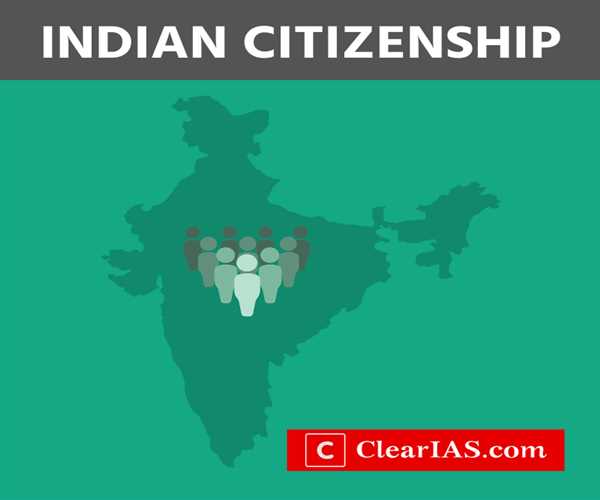The Citizenship of India is covered in Part II (Articles 5–11) of the Indian Constitution.
The Constitution of India lays down the provisions related to Citizenship in India. Articles 5 to 11 of the Constitution cover all aspects of Citizenship in India.
Article 5 states that “every person domiciled in the territory of India shall, subject to the provisions of this Constitution, be a citizen of India.” This means that anyone residing in India shall be considered a citizen of India, regardless of their religion, caste, or class. It also covers the provisions related to acquiring Indian Citizenship by birth, descent, or registration.
Article 6 states that a person born in India on or after 26 January 1950 is a citizen of India by birth. Such a person would become a citizen of India by descent if either of his/her parents were a citizen of India at the time of his/her birth. The same would apply to a person born outside India on or after 26 January 1950 if either of his/her parents were a citizen of India at the time of his/her birth.
Article 7 states that a person can become a citizen of India by registration if he/she has resided in India for at least five years. It also states that a person of Indian origin, who is ordinarily residing outside India, can also become a citizen of India by registration if he/she is a spouse of a citizen of India or a person of Indian origin who has been registered as an overseas citizen of India.
Article 8 states that a person of Indian origin who is ordinarily residing outside India and who is a spouse of a citizen of India or a person of Indian origin who has been registered as an overseas citizen of India shall be deemed to be a citizen of India.
Article 9 states that a person of Indian origin who ordinarily resides outside India can become a citizen of India by naturalization if he/she has resided in India for at least seven years. It also states that a person of Indian origin who ordinarily resides outside India can become a citizen of India by naturalization if he/she resided in India for at least 12 months.
Article 10 states that a person who is not a citizen of India by birth or descent can acquire citizenship of India by naturalization if he/she has resided in India for at least 12 years. It also states that a person who is not a citizen of India by birth or descent can acquire citizenship of India by naturalization if he/she has resided in India for at least seven years and has renounced the citizenship of any other country.
Finally, Article 11 states that a person of full age and capacity, who is not a citizen of India, can acquire citizenship of India by naturalization if he/she has resided in India for at least 12 years. It also states that a person of full age and capacity, who is not a citizen of India, can acquire citizenship of India by naturalization if he/she has resided in India for at least seven years and has renounced the citizenship of any other country.
Thus, the Constitution of India covers all the provisions related to Citizenship in India. From the acquisition of Indian Citizenship by birth, descent, or registration to the acquisition of citizenship by naturalization, all aspects of Citizenship in India are covered under Articles 5 to 11 of the Constitution.
